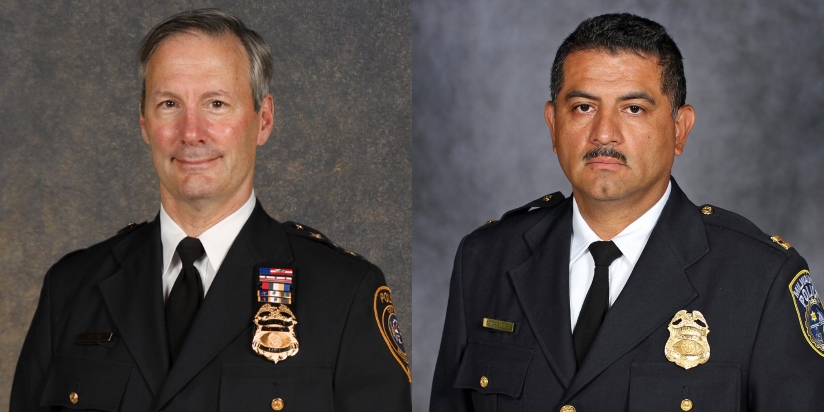Who Now Has Power Over Police Chief?
Common Council may regret stripping mayor’s power over Police-Fire director.
Tuesday the Milwaukee Common Council voted by 13-1 to ask the state Legislature to end the mayor’s power to directly appoint the Executive Director of the Fire & Police Commission (FPC), as Urban Milwaukee reported. The vote was a massive rebuke to Mayor Tom Barrett, and a sign that he continues to have much less clout with the council. But the council meanwhile seemed unaware of the back story to why the mayor had such power in the first place. For the ghost of autocratic Police Chief Harold Breier looms in the murky past on this issue.
For most of Milwaukee’s history, the FPC’s leader was selected by the members of the commission. This was changed in 1988, shortly after John Norquist was elected mayor. While this was part of a legislative change that gave Norquist the power to directly appoint a number of cabinet members, helping transform the city’s “weak mayor” system, the FPC appointment power fell into a special category, because of the long and controversial reign of Chief Harold Breier.
“He was accused of tolerating excessive police force, especially when minority citizens or counterculture youth were involved, and presiding over a racially segregated police department,” as one historian writes. Breier saw himself as serving “the good people of Milwaukee” and minority residents took that to mean white people. Breier’s view of school desegregation was that ”We have bused crime all over the city.” He forbid his officers from giving sworn statements to attorneys investigating police misconduct, and resisted any attempts to curtail his power by the Fire and Police Commission.
And when controversies arose about Breier, Mayor Henry Maier who served from 1960 to 1988, would often wash his hands of the issue, telling the press he had no power over the police chief.
There was some truth to that, since the chief had a lifetime appointment and the FPC had less power over the police department in those days. The state legislature ended the lifetime tenure in 1977 (exempting Breier) and then in 1984 gave the FPC greater power over the police department, enough of a change that Breier decided to retire.
So the 1988 change giving the mayor power to appoint the head of the FPC was passed by legislators well aware of the Maier and Breier years. Few wanted another imperial chief, nor a chief over whom the mayor had no control. Thus when Ald. Robert Donovan recently told a Common Council committee that ending the mayor’s appointment power was a return to the good old days of an “independent” FPC, he is greatly simplifying history.
In fact, Breier was not the only autocratic chief. He was perhaps surpassed by John Janssen, who served from 1888-1921 and was sometimes called the “Czar” as writer Tom Bamberger recounted in a Milwaukee Magazine feature. When Socialist Mayor Emil Seidel wrote a letter asking for the chief’s resignation, Janssen replied: “Go to hell. Neither you nor any other mayor can request my resignation and get away with it.”
In short, the FPC increase in power is recent, as is the mayoral appointment of its executive director. The new plan to hand the appointment power to the citizen members of the FPC will give the mayor less control. Yes, the mayor will still appoint members of the FPC, but that’s a cumbersome way to maintain power over the executive director. And if the mayor from now on has less power over the executive director, he or she will have less control over the police chief.
Indeed, we’ve already seen that happen. The FPC declared it would do a national search for a permanent police chief and then decided, without any public notice or any public discussion, to promote the acting chief Alfonso Morales to this position. This was in violation of state law to give public notice, the city attorney ruled, and “certainly looks pretty rammed through, pretty arbitrary,” as Ald. Bob Bauman complained at a council committee meeting. This was a key reason Barrett decided to fire FPC executive director MaryNell Regan.
And it certainly won’t be the citizens of Milwaukee, who do not elect any of the FPC members. In the latter days of Chief Ed Flynn, we heard complaints that he was not answerable to “the community,” but this did not mean the city’s residents, of whom a sizable majority supported Flynn (according to polls) right up until his resignation. This was a reference to the unelected community activists who show up at FPC meetings and demand changes. If the goal is to have a police chief most answerable to the entire community, the only official elected by all the city’s voters is the mayor.
As this history suggests, there are no easy answers as to the proper structure for overseeing the police chief. You want a chief with enough independence of political officials to make decisions based on how best to fight crime, even if if means less cops placed in some council members’ districts. The creation of the FPC was done to insulate the chief from political decisions. But if too insulated, you can get a Breier-style autocrat. Or, under the newly proposed approach, a chief over whom the mayor has almost no power.
True, the police chief serves only a four-year term and will then come before the Fire and Police Commission, but it will be a commission over which the mayor has little power. Yet when something goes wrong in the police department the voters will naturally expect the mayor to do something about this. But the mayor, whoever that person is in the years to come, can simply emulate Henry Maier and say I have no power over the chief.
If you think stories like this are important, become a member of Urban Milwaukee and help support real independent journalism. Plus you get some cool added benefits, all detailed here.
Political Contributions Tracker
Displaying political contributions between people mentioned in this story. Learn more.
- May 25, 2017 - Tom Barrett received $500 from MaryNell Regan
- March 3, 2016 - Tom Barrett received $500 from MaryNell Regan
Murphy's Law
-
Judge Borowski Gets On His High Horse
 Feb 19th, 2025 by Bruce Murphy
Feb 19th, 2025 by Bruce Murphy
-
United Way Funding Flat Since 2017
 Feb 17th, 2025 by Bruce Murphy
Feb 17th, 2025 by Bruce Murphy
-
MPS, City Feud Over Paying School Resource Officers
 Feb 12th, 2025 by Bruce Murphy
Feb 12th, 2025 by Bruce Murphy























Really!? Apparently the Common Council members did not think this through. We cannot afford a rogue police chief and a return to the ‘good old days.’ We already have enough police misconduct with its ‘code of silence’ in our segregated city.
I believe the answer is simple. Put the chief of police on par with every other city department’s director. That is, get rid of the Fire and Police Commission. Allow the mayor to appoint the fire and police chiefs, with Common Council giving final approval (same as every other department director) and make the budgets of each subject to Common Council approval. Unhappy citizens could still complain via their local Alderman and the Alderman can exert pressure on these Chiefs via control of their budgets.
I just don’t see that the FPC does anything beneficial in this whole set up.
Good idea GreenDoor. We’ll see how far this goes. LOL
except that the FPC provides a buffer that protects Barrett. Funny how many people ‘report directly to Barrett’ and yet he never seems to know what’s happening until 3 months later. “The Trolley derailed and rolled into Lake Michigan last March? We’re going to form a task force to make sure that never happens again!”